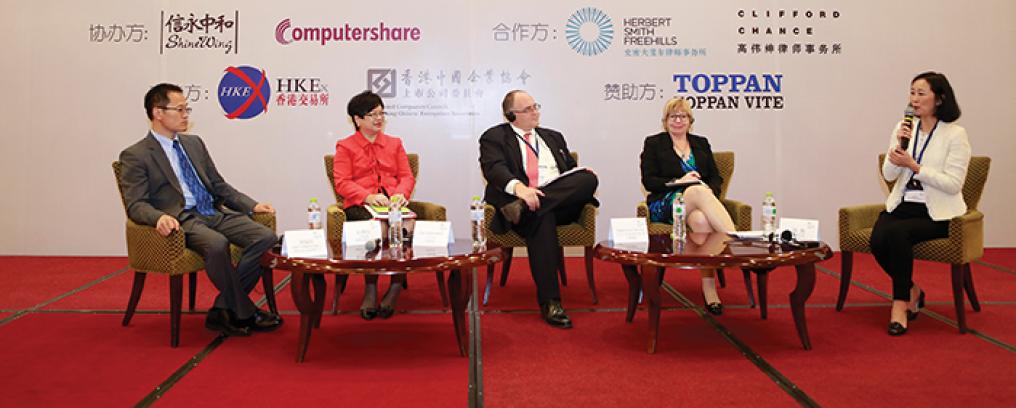Lucy Newcombe, Director, Global Corporate Communications, Computershare, looks at the trends and transformations emerging from this year's AGM season.
Globally, the 2015 AGM season saw an increase in shareholder activism, including in Asia. There were two particularly notable campaigns in Asia, one in South Korea and one in Japan.
In Korea Elliott Associates LLP, a US hedge fund that is also active here in Hong Kong where it is trying to force BEA to disclose papers relating to Japanese multinational banking and financial services company Sumitomo Mitsui, ran a lengthy campaign opposing Samsung Group's proposed merger of two of its business units. The campaign included court proceedings to try to prevent the corporate action. Elliott considered Cheil Industries Inc's offer to buy Samsung C&T Corp unlawful, creating significant regulatory risk and being disadvantageous to minority shareholders. The campaign pitted Elliott against South Korea's wealthiest family and the country's largest conglomerate, ground that few activists have previously dared to tread in a country which is widely acknowledged as being well behind the curve in terms of corporate governance in the developed world.
Despite Elliott losing the battle, awareness of minority shareholder rights was raised significantly in South Korea and it is hoped that the impact of the struggle may help influence future activist attempts in the country.
Governance advocates may also take some solace from signs of change in Japan, which historically has shared many corporate practices with South Korea. Japan's Stewardship Code (finalised in February 2014) and fully implemented in August the same year, was introduced with the aim of promoting sustainable growth of companies through investment and dialogue. Institutional investors are expected to follow the spirit of the Code in their activities and take proactive measures to further enhance dialogue with their investee companies.
Consequently, companies are starting to react more positively to outside investors focusing attention on corporate governance. US investor Daniel Loeb's hedge fund, Third Point LLC, pushed to break up Sony Corp and while the company rejected Mr Loeb's specific requests, the Japanese technology giant made some major concessions before Loeb subsequently sold his whole stake last October, realising a 20% gain on his initial US$1.1 billion investment. The businessman moved on to the secretive Japanese robot-maker Fanuc Corp – which then voluntarily increased its dividend and started an investor relations department after Mr Loeb began requesting changes.
Hong Kong and Mainland China
If AGMs in China were held in August and September rather than generally in May and June, it's very likely we'd be looking at a totally different set of figures relative to this year's attendance and voting. Dubbed 'Black Monday’, 24 August ended with Chinese equities down 8.5%, wiping out hundreds of billions of dollars in market capitalisation. The following few days also saw drops across the market, albeit not quite as dramatic. According to the Associated Press news agency, roughly
6% of Chinese households own stocks and shares, so images of worried-looking retail investors flooded news feeds around the globe.
If AGMs had been held that week, it is easy to imagine that organisers would have been inundated with attendees concerned to hear about plans for stabilising their investments, that venues would have been unable to cope with the volume of shareholders turning up, security would have been stretched and the local and international media would have had story after story to write about.
In reality, the 2015 AGM season saw a continuation of the attendance and voting trends we have seen in recent years. Shareholder numbers for the meetings with poll voting that Computershare manages across Hong Kong and China rose by more than 3,300 more people, an increase of 8% year on year. The numbers attending large meetings – those with more than 100 attendees – rose most sharply, increasing by an average of 60 people per meeting.
Bank of China was overtaken by the Industrial and Commercial Bank of China (ICBC) in terms of in-person attendance – with 4,895 people showing up for ICBC's meeting. BOC had 4,346 shareholders attend in person, the vast majority of these in Hong Kong. China Construction Bank had the third highest attendee numbers, with 3,217 people from China and Hong Kong making the journey to the meeting.
However, disappointingly, this increase in attendance continues to be let down by a lack of voting – with a year-on-year fall of over 5% in voting by those attending the 766 meetings that Computershare runs. Some of this could well be attributed to late arrival – those arriving late at an H-share meeting are not entitled to cast their vote. The message for companies remains – if there is a big difference between your attendance and voting numbers, quite simply you are paying to host people who are not contributing to the corporate governance of your entity. If you want to derive benefit from shareholders who take the time and trouble to attend in person but do not vote, you need to consider the communications you have in place to encourage on-time arrival and voting at the AGM itself.
Happily, overall, the percentage of issued share capital voted (as opposed to the number of individuals who vote their shares) across the meetings that Computershare manages remains comparable and often higher than levels in other countries – with 76% of issued share capital being voted this season.
In China, the state of the stock markets in the spring will be a major factor in attendance and voting levels at AGMs in 2016.
In Hong Kong, the shareholder engagement consultation released by the Securities and Futures Commission has come in for some heavy criticism from listed companies and institutional investors alike, so it remains to be seen what will eventually be put into place and whether this will affect how companies approach AGMs in the future.
Germany
In 2014, many companies on the DAX, the German blue chip stock market index, experienced increased institutional shareholder voting at their AGMs. This was thanks to extensive investor relations activity and educational programmes that had been put in place to counter the effect of a 2012 court decision which created uncertainty among investors and custodians as to how to execute a legally sound cross-border vote at German AGMs.
In 2015, AGM attendance in Germany saw a slight decrease compared to the previous year, but this may reflect the better investor relations resulting from the investments described above.
One significant change for the 2016 season is the new requirement for mandatory reporting of voting rights belonging to third parties, which has been adopted under the Small Investor Protection Act. It remains to be seen whether this will increase retail investor presence at meetings in future seasons. The Act also removes the uncertainty around cross-border voting.
UK
A relatively quiet AGM season in the UK saw another slight decrease in overall attendance, though thanks to the prevalence of electronic voting solutions, the percentage of issued share capital that was voted rose again year on year and is around 65% for Computershare clients in the FTSE350. 100% of Computershare's FTSE350 clients now offer both eProxy and Crest proxy appointments, which has further minimised the amount of paper in the voting chain. We anticipate that this will continue to be the norm during future AGM seasons.
Another point of note is that, in spite of shareholders now having a binding say on pay, more people are still contesting companies’ remuneration reports (compensation already paid) rather than companies’ remuneration policy (future pay plans). As a result, no companies have yet lost a vote on their remuneration policy.
Changes to the UK listing rules were introduced by the Financial Conduct Authority in May 2014 which require premium listing companies (a group of companies that are, amongst other criteria, traded on the London Stock Exchange) with controlling shareholders to 'dual report’ on the results of resolutions electing independent directors, starting this AGM season.
A controlling shareholder is anyone holding more than 30% of the total voting rights of a company. The shares can be held by one person, or collectively with other associates or shareholders acting 'in concert’.
The changes mean that the votes cast by a controlling shareholder need to be deducted from the final result of specified resolutions, providing an independent shareholders’ result in addition to the standard result representing the votes of all shareholders so that everyone can see what the result would have been without the controlling shareholder's votes.
US
Proxy access has been the biggest issue for the 2015 season in the US, and has been a significant turning point for the issue as a record number of proxy access proposals gained widespread support.
‘Proxy access’ describes the ability of shareholders to directly access a company's proxy materials, including permitting the inclusion of a shareholder-proposed director nominee (or slate of nominees) and a statement in support of the nomination(s) in the company's proxy statement. Although current US securities regulations do not grant shareholders access to company proxy materials, proxy access may be available to shareholders by way of a company's organisational documents (for example, articles of incorporation, bylaws or corporate governance guidelines), as permitted by state corporate law.
While proxy access did not garner significant attention over the past two proxy seasons, it is one of the most notable developments of the 2015 proxy season. There were 106 proxy access proposals submitted this year, of which 16 were withdrawn or omitted. On average, proxy access has garnered 54% support, with 49 companies receiving a majority of votes cast in favour (only six companies were in this category in 2014).
Proxy access is no longer unusual, although it is far from being a practice as generally accepted as, for example, majority voting for directors. Even so, as proxy access becomes more common, it appears likely that it will rarely be used (consistent with its rare use in other countries where it is more commonly in place). It also seems unlikely to be used by shareholder activists who engage in traditional proxy fights. Rather, it will most likely be used as a carrot to encourage companies to engage their investors and to take action on issues of importance to them.
Australia
Computershare was involved in over 750 meetings in Australia in 2014, with the busiest period between September and early December. While the amount of issued capital voted across all companies remained flat at 45.4% in 2014, there was a decrease of almost 6% in the issued capital voted for ASX50 companies. However, the amount of issued capital voted via online services has increased over 260% since 2010 – from 8.9% to 32.8%. In the last year alone it increased by 37.8%.
The change in voting participation was minimal, with 5.27% of shareholders voting, up 0.3% on 2013. A downward trend in attendance has continued, with numbers dropping by approximately 10% per year, until this season when it increased slightly, up 0.8% on 2013.
The 2014 meeting season was the fourth season that the Australian two strikes legislation was in operation. This requires the board of a company to stand for re-election if 25% or more of votes are cast against remuneration two years in a row and is designed to give shareholders more power. In 2014, more companies received a first strike (85 in 2014 compared with 80 in in 2013), however the number of companies receiving a second strike decreased by over 50% (10 in 2014 compared with 22 in 2013). Awareness around the directors’ remuneration report has increased since the introduction of this legislation, and has contributed to a decline in the overall number of strikes received. Companies are also engaging proxy advisers in discussions with large institutional holders on their remuneration report policies in advance of a meeting.
In 2014 the level of investor discontent regarding executive pay was higher for companies in the ASX300. Analysis of the proportion of votes lodged against the remuneration report shows the average was 7.4% in the ASX300, versus 5.8% for companies outside the ASX300. Votes against the remuneration report for ASX50 companies are at the lowest percentage of all ASX groupings, revealing that investor discontent about executive pay appears to increase from the ASX50 through to the ASX300.
Lucy Newcombe
Director, Global Corporate Communications, Computershare
SIDEBAR: Attendance trends in German AGMs
SIDEBAR: Key trends in Hong Kong and Mainland China





